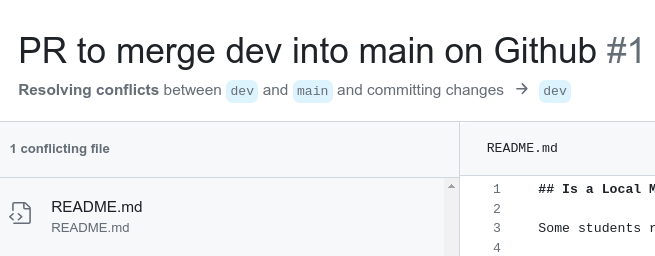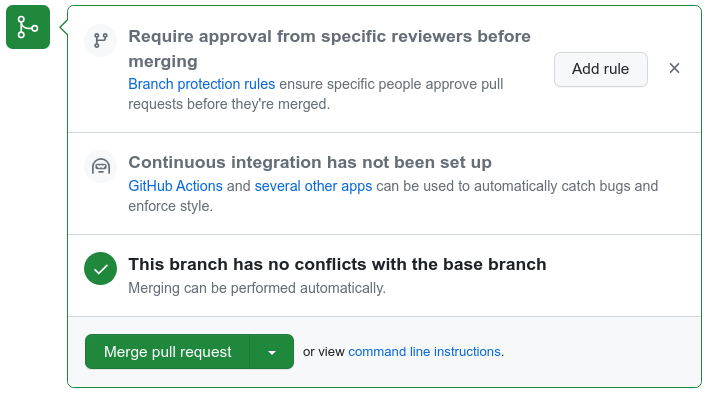Students reported that merging on Github first merges into the feature branch and then back into main/master.
To see this, I created this repository with two divergent branches main and dev. Then merged twice: once locally, once on Github.
Initial files:
- Add a README (like this one) to
main.
-
Create a
devbranch. -
Switch to
devand modify README. Commit the changes. -
Make more changes and commit again.
dev is now ahead of main by 2 commits.
-
Switch to
mainand add these lines to README. Commit the changes. -
Add more lines and commit again.
After committing those changes, the repo looks like:
The graph shows that main and dev have diverged.
Before merging, I pushed this repo to Github so I can repeat the merge on Github and see how it compares.
After pushing the pre-merged files on both branches to Github, I ran:
git checkout main
git merge dev
Conflict!
git mergetool # I use a visual mergetool to fix conflicts
After resolving the conflicts I committed README.md to main
git add README.md
git commit -m "merged locally"
Now the repo looks like this. Notice that the merge commit is on main. (This is what we expect.)
On the pre-merged repository on Github, I created a Pull Request to merge dev into main, as suggested by Github.
Github reports conflicts and offers to open a "conflict resolution editor" like this:
Notice the text at top: Github is merging main into dev
After resolving the conflict and commiting, the repo on Github looks like this:
Notice the new commit on dev where the merge occurred.
After resolving and commiting the conflict, Github presents the
usual PR web page for a merge of dev -> main.
On a team project you would wait for the team to comment and approve.
I clicked "Merge pull request", and it merged dev into main. So finally the repository on Github looks like:
Github wants to protect the main/master branch from buggy, untested code. So, it resolves conflicts on another branch first.
You can then test and review that branch. Or use CI to run tests.
This avoids introducing untested code and possible errors in main.
If you open a PR and Github find conflicts, the Github conflict resolver merges the changes into a branch rather than main. This projects the main or master branch from untested code that may contain errors.
After conflicts are resolved, you should re-test your code, and then proceed with the PR as usual.
We can do this locally, too. Instead of merging dev -> main, we can checkout dev and merge main -> dev. Then test and review it to verify the merge did not produce any errors.
Finally, if everything looks good then merge dev into main, which will be a simple "fast forward" merge.





